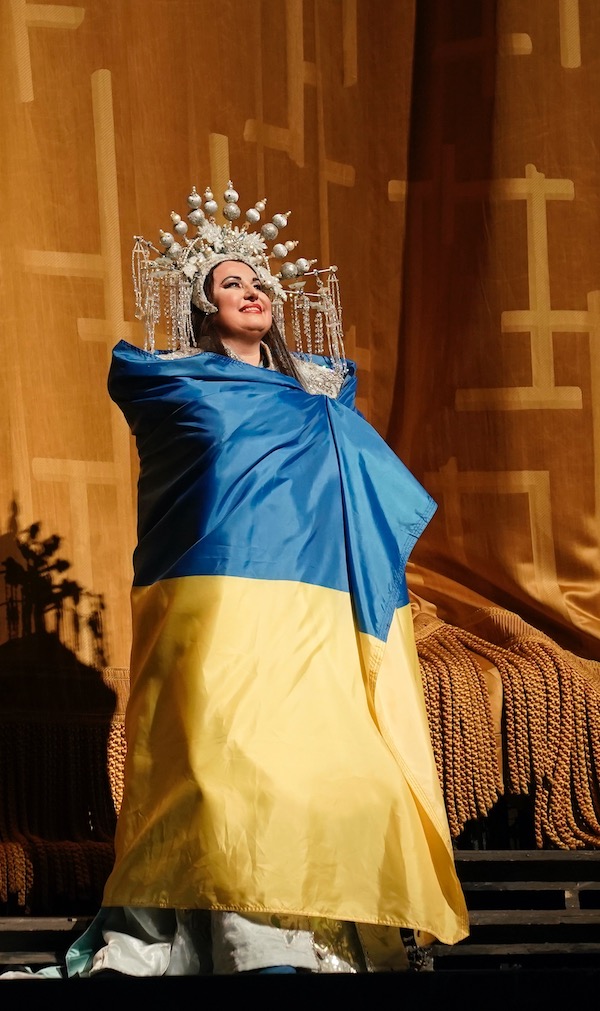
Soprano Liudmyla Monastyrska at The Met! Photo: Ken Howard / Met Opera
Dear Commons Community,
Yesterday, my wife, Elaine and I went to our first Metropolitan Opera performance since Fall 2019 due to COVID. It was a long absence and we missed The Met dearly.
If you are only going to see one Met opera in more than two years, surely a Franco Zeffirelli production of Puccini’s Turandot is on the top of your list. The lavish setting, the music, the singers, the chorus, and the emotional story itself all delivered. Yonghoon Lee as the prince-suitor Calàf was fine and his Nessun Dorma in the Third Act brought the House down. The other principal singers especially soprano Ermonela Jaho as Liu and bass Ferruccio Furlanetto as Calaf’s father were excellent. The chorus was exceptional especially in the final scene. However, much of the audience attention was focused on the Ukrainian soprano, Liudmyla Monastyrska, who replaced Anna Netrebko. She was truly fine in the closing scene as the ice princess melting into “just a woman.”
During the final curtain call, The Met audience went crazy for Monastyrska when she appeared after all of the other performers, alone draped in a blue and gold Ukrainian flag (photo above).
What an afternoon!
If you going to the opera this season, Turandot at The Met is must see.
Below is a review by critic, David Wright.
Tony
————————————————————————————————-
A fresh cast and Ukrainian soprano lift the Met’s spring “Turandot”
Sun May 01, 2022 at 1:39 pm
By David Wright
With a sturdy-voiced Ukrainian soprano replacing the star who withdrew amid controversy over her relationship to the current Russian government, Puccini’s final opera Turandot returned to the Metropolitan Opera stage for its spring run Saturday night.
As always, Franco Zeffirelli’s fantasy setting of a Chinese imperial court, with its gilded terraces, liveried attendants, long-sleeved ladies-in-waiting, dancers, mimes, and acrobats—and the common people slithering around on all fours like lower-level primates—was an eye-popping spectacle. But so is the Rose Parade. The question was, can the new cast make Puccini’s score and story sing?
Vocally, the singers in the principal roles were up to the task, and in the case of tenor Yonghoon Lee as the prince-suitor Calàf, well beyond that. Dramatically, they seemed to be feeling their way through Zeffirelli’s conception of a decadent regime in need of reviving by a virile outsider, without really driving the point home.
Granted, that was a lot to ask in this not-quite-Wagner, not-quite-Stravinsky, not-quite-verismo, not-quite-finished opera. But if the production’s blocking calls for Calàf to wander among the ritually-posed courtiers like a pouty, alienated James Dean, one would like him to project that attitude, rather than look as though he doesn’t quite know where to stand in the tableau.
And after a long history of cuts and rewrites, the final scene of Calàf and Turandot alone onstage, composed by Franco Alfano using the late Puccini’s sketches, remains intractable. It certainly needs something other than revival director J. Knighten Smit’s conventional criss-cross blocking. Maybe it would be best to discard realism entirely and just stipulate that he successfully woos her, and then sit back and enjoy the singing.
Which, for the two leads at that point Saturday evening, was in full flower. Lee’s voice, broad-based yet focused, sounded terrific from Act I on. But even this very assertive role would have benefited from some throttling back here and there—the iconic, nocturnal “Nessun dorma” started loud and just got louder, perhaps to make sure “nobody sleeps.” And Lee’s wide-spaced singing stance quickly became a macho mannerism.
Stepping in for the jettisoned Anna Netrebko as Turandot, soprano Liudmyla Monastyrska at first sounded somewhat fluttery and rough in “In questa reggia” but found true imperious tone as she posed her fateful riddles to the young prince. The closing scene may have been unconvincing dramatically, yet this ice princess’s vocal melting into “just a woman” was aurally satisfying.
In supporting roles, soprano Ermonela Jaho was a model of delicate inflection and exquisite pianissimos as the faithful, secretly-smitten servant Liù. In a night short on ovations by Met standards (except for the applause-begging “Nessun dorma”), Jaho’s beseeching “Signore, ascolta” in Act I earned the warmest audience response.
Celebrated bass Ferruccio Furlanetto was rich casting indeed as Timur. He was a friendly, if indistinct, presence as Calàf’s father in the early scenes, and sang most affectingly to his dead servant girl in the last act. (Though one couldn’t shake the thought of Puccini and librettist Giuseppe Adami saying “some pathos needed here.”)
In the opera’s source, Carlo Gozzi’s 18th-century Venetian play, the imperial officials Ping, Pang, and Pong were commedia dell’ arte characters, and their names in the opera seem to promise comical Chinese stereotypes. However, Puccini wrote them, and Zeffirelli staged them, as quite reasonable plot-advancers, urging Calàf to escape this bloodthirsty court while he can. Their Act II trio “Ola, Pang!” about longing for their homes in the country, though a somewhat inartful insertion in the opera, was feelingly sung by the hearty-voiced baritone Alexey Lavrov as the Lord Chancellor Ping, ably supported by Tony Stevenson as the majordomo Pang and Eric Ferring as the head chef Pong.
Jeongcheol Cha was a stout-toned Mandarin announcing edicts and ceremonies, and Carlo Bosi was appropriately dim of voice as Turandot’s doddering father, the “mighty” Emperor Altoum.
Despite having to spend much of the evening in a simian crouch, chorus master Donald Palumbo’s Met chorus enhanced this drama in every mood, be it barbaric or dreamy.
Conductor Marco Armiliato led Puccini’s percussion-heavy orchestra with panache—the piccolo got a workout, and even the horns seemed to jangle—but also managed some lovely intertwining of the winds with Liù’s vocal curlicues.
After the final curtain, soprano Monastyrska came out for her bow spreading what looked like a colorful cloak, until she wrapped it around her, revealing the blue and yellow bands of the Ukrainian flag. The audience roared its support for her and her country.


